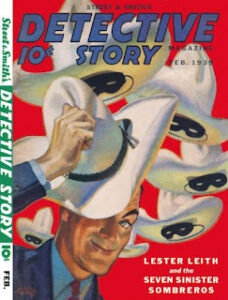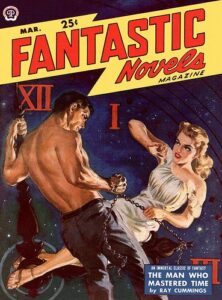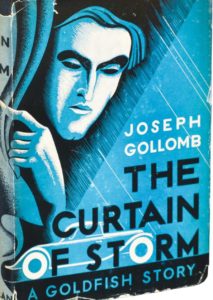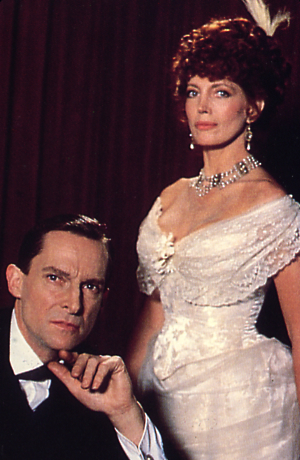
Gayle Hunnicutt as Irene Adler
Just like our own personal stories, the narratives of fictional characters can take on a life of their own. An author will invent a character for a particular purpose and the next thing they know other creators are making up news stories for the character that send them in a completely different direction. It’s a hell of a thing.
Take for example Arthur Conan Doyle’s character Irene Adler. If you know the character, it’s probably from the original Holmes story A Scandal in Bohemia or from one of the various dramatizations of the Holmes story, or from one of the many Holmes pastiches featuring her either as a main or supporting character.
You know, she’s the Sherlock Holmes villain that was maybe more of an anti-hero, or perhaps a sex worker/dominatrix, or maybe some kind of spy, or maybe not. She’s the character that became Sherlock Holmes’s lover and possibly even the mother to his child. Or maybe none of that and she just wanted to be left alone to live with her husband. Well, maybe yes and maybe no. It’s complicated. The character has experienced many interpretations over the years.
Irene Adler was created by Arthur Conan Doyle as a one-time adversary for Sherlock Holmes. She was introduced in the July 1891 issue of The Strand magazine, in the very first Sherlock Holmes short story A Scandal in Bohemia. There is no indication that Doyle ever intended to use her character again, but her personality proved to be so fascinating that fans created new stories for the character, and she has continued to appear in various media well over a hundred years after she was created.
At the beginning of A Scandal in Bohemia Watson tells us that Irene Adler is “…of dubious and questionable memory” and Holmes’s client, the King of Bohemia, refers to her as “…the well-known adventuress”. It isn’t specifically stated in the story why both Watson and the King are throwing shade on Adler, but, as Pulp and Victoriana expert Jess Nevins explains, in the culture and time the story was written the term could indicate any level of scandalous behavior by a woman, from using sex to get what they want, to merely living an unconventional life. We know from the story the King has an axe to grind with Irene Alder, so we have to take his negative remarks with a grain of salt. As the story unfolds there doesn’t seem to be any indication that Irene slept with men for money or position, but we do learn just how extraordinary and unconventional she is.

What is it about Irene Adler? In brief, she’s awesome.
Irene Adler isn’t actually on stage much in A Scandal in Bohemia, but we learn from what others tell us, and from the few scenes she’s in, that she’s a force to be reckoned with. From Holmes’s famous “Index” we are told that she is an American from New Jersey who has traveled widely in Europe and is a former Prima Donna of the Imperial Opera of Warsaw.
Even though Adler’s role is central to the story most of her actions are related by Holmes’s pal Watson second hand. In one of the few moments that Watson sees her he doesn’t realize it. At the time she was in disguise as a man so she could shadowed Holmes and Watson back to Baker Street. Her disguise was so good even Holmes didn’t recognize her when she wished him ‘goodnight’ merely because she couldn’t resist metaphorically tweaking his nose. At the end of the story she leaves a note that explains that she often dressed as a man to, “…take advantage of the freedom which it gives”.
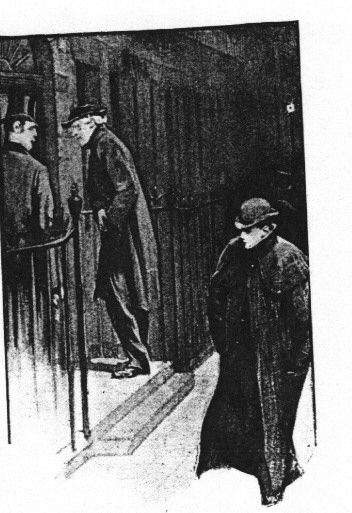
All the people in the adventure are impressed with her. The story opens with Watson telling us that Holmes admires her over all other women; that Holmes believes she, “…eclipses and predominates the whole of her sex”. Holmes’s client, the King of Bohemia, says, in his 19th Century, patriarchal way, that Adler, “…has a soul of steel. She has the face of the most beautiful of women and the mind of the most resolute of men”.
The most important aspect of Sherlock Holmes’s character is his extraordinary intellect. Certainly, his bohemian idiosyncrasies, energy, and forceful personality are important and endear him to us, but it’s his genius that most clearly identifies him and drives his stories. Therefore, it’s important that in A Scandal in Bohemia Irene Adler ultimately wins Holmes’s admiration by outwitting him and escaping to freedom. Let that sink in; she beats Sherlock Holmes in his own story by outthinking him. She is one of the few characters, along with the equally interesting Professor Moriarty, who can match Sherlock Holmes’s intelligence and ability.
At the end of the adventure, after Adler makes her getaway, Holmes reads a note she left in which she explains how she outwitted him and promises to take no action against the King, if he in turn does not threaten her. The King accepts this resolution, stating that he knows he can trust her word of honor implicitly.
The two men who have met her in the story–the King of Bohemia and Sherlock Holmes – rave about her intelligence, resolve and superior character. We know she’s a talented singer and actress and, while she wisely respects Sherlock’s ability, she does not hesitate to engage him in a battle of wits. It is surprising that Doyle didn’t use Irene Adler again, because it seems clear that he wanted us to like and respect her.
Holmes’s client, the King of Bohemia, is quickly established as a self-involved dipshit, and in his conflict with Adler we are meant to sympathize with her. Additionally, as Holmes’s adventures go this one has very few stakes. No one has been murdered, nor is a criminal mastermind attempting to rob the Bank of England. Holmes enjoys himself in the story, he’s amused by the turn of events that force him to act as witness to Irene’s wedding and seems appreciate the challenge of matching wits with someone of her caliber.
All in all, she is a fascinating character and there’s little wonder that people began creating new stories for her, when Arthur Conan Doyle didn’t. At the end of the story, it’s evident that Holmes is fascinated, and perhaps a bit infatuated, with the Irene Adler. For Irene’s part, however, she seems to view Holmes as an amusing and formidable opponent but does not seem to give him much thought outside of their confrontation. All her actions that display affection are directed toward a man named Godfrey Norton who she marries in the story.
Relationship to Holmes.
One element that is very common in non-canon appearances of the Irene Adler character is that she is presented as being romantically or sexually involved with Sherlock Holmes. In Doyle’s story that is certainly not the case. If anything, she has very little consideration for Holmes besides respecting his abilities as an opponent. The whole motive for her in A Scandal in Bohemia is to marry Godfrey Norton, evade any actions by the King of Bohemia that could hurt her, and outwit Holmes so she can make her escape. All of which she does with complete success.
On Holmes’s part, there are clear indications that he has developed strong feelings for her. When the King offers to give Holmes a jeweled ring as payment for his services, Holmes instead requests the picture of Irene that she’d left for the King. And, of course, we know from Watson that Holmes refers to Irene as “The Woman”. Of course, Watson is quick to point out that Holmes would never allow romantic feelings to intrude on his precise and logical mind. Watson has not always been the most incisive of observers and it does seem possible that Doyle intended the audience to imagine that Holmes felt “that way” about Irene. However, it’s also clear from her behaviors that she’s in love with Godfrey Norton, and her only thought for Holmes is as an amusing opponent in an adventure that she wants to conclude as quickly as possible. But then, of course, the fans stepped in.
We can see from whence this comes. Holmes is an immensely important and influential character in fiction, and, more than a hundred years after his creation he still has a passionate and dedicated audience. He has a powerful place in the mental life of his fans who want to delve deeply into their favorite character’s personal and emotional life. And since they didn’t get that from the official stories, they create their own narratives that provide what they’re not seeing in the official stories. That is one of the principal attractions of pastiche and fan fiction.
In the case of a presumed intimate relationship between Sherlock and Irene, it ticks many of the boxes for fans of the Holmes mythos. Some fans want to ship Holmes with another character to add frisson to his fictional life that lacks any kind of overt sexual drama. Many fans have selected Irene Adler for this scenario because she is a fascinating character that Holmes admires and provides a ‘safe’ person for Holmes to be intimate with, for those audience members who are too homophobic to accept the more obvious possibility of Holmes being romantic with Watson.
In some of the media in which she’s appeared, the characters given the name Irene Adler are so different from the character created by Doyle that they are functionally different characters altogether. For instance, in the BBC Sherlock episode A Scandal in Belgravia, the character is a dominatrix and blackmailer who is, of course, deeply in lust with the Sherlock character. This representation plays up the femme fatale implications of the character, that were only evident in the original character because all the other (male) characters had unsubstantiated ideas about Adler’s past activities. Not that any actual illicit activities with consenting adults would necessarily be bad, but there’s no real evidence in A Scandal in Bohemia of any of that.
People can create whatever stories that they enjoy in the way that best satisfies and suits them. The stories that pair Holmes with Irene Adler, however, typically result in her character being diminished. Many of the stories that feature the relationship between Irene and Sherlock, always seem to put Holmes squarely in the dominant position. Author John Lescroart wrote two mystery novels featuring “Auguste Lupa” who is not only intended to actually be a young Nero Wolfe but also the son of Holmes and Adler. In the Guy Ritchie Holmes movies Irene is a spy and agent working for Professor Moriarty, until he kills her as a step in his duel with Holmes. In the Moffat and Gatiss BBC Sherlock series, Irene is a dominatrix, blackmailer, who is deeply in lust with Holmes and spends most of her screen time flirting with Sherlock. At the end of the episode, she faces death until Holmes rescues her. In the CBS Elementary series, Holmes and Adler have a deep sexual and romantic relationship, until Holmes discovers that she is actually a criminal mastermind, and he must, with the help of Watson, outwit her. For some reason it seems the audience can’t accept that Holmes would ever be consistently beaten, especially by a woman.
Of course some authors prefer to adhere more closely to the Canon, and there have been some works that feature Irene Adler as a protagonist that portray her as interesting and formidable in her own right. There are the wonderful Moriarty: The Hound of the D’ubervilles and The Angels of Music by the excellent Kim Newman that feature Adler as whip smart and dangerous adventuress, and a long running mystery series by Carole Nelson Douglas that begins with Goodnight, Mr. Holmes.
Anyone can create the stories they want to see. I get it, the will to ship your favorite characters is strong, especially one like Holmes who is so incredibly revered and charismatic. These characters have always offered us wish-fulfillment, which extends to wanting them to be in powerful, emotional relationships. This is particularly true now when the culture of fandoms relies so heavily on imagined relationships between characters. That’s an understandable and fun embellishment to a fictional world that allows us to enjoy a set of stories in a new way, outside of the established canon.
In this case however, I think we’re doing the character of Irene Adler, and her audience a disservice by making a romantic/sexual relationship with Sherlock Holmes the key element of her identity. Irene Adler is such a fascinating badass in her own right. If we define Irene Adler only in reference to her character as Holmes’s lover, it diminishes her as a heroine. The important aspects of Irene Adler are her unconventional genius and courageous integrity, not who she may or may not be in a relationship with. In the end, she’s way too much fun to be in any one’s shadow, even the Great Detective’s.
